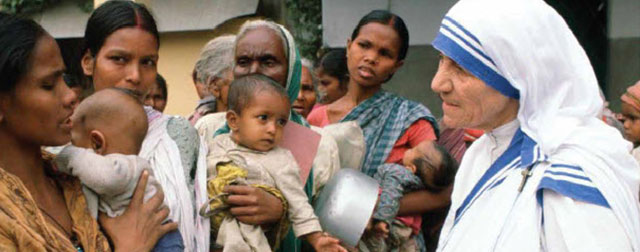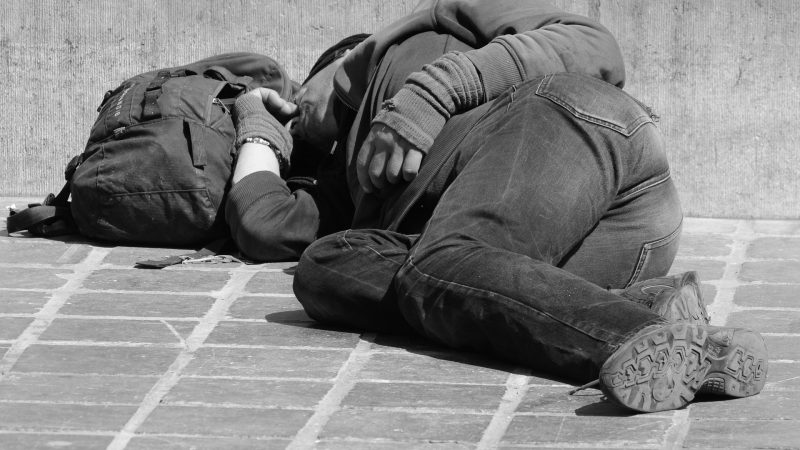Pope Francis has declared Mother Teresa a saint, honoring the nun who cared for the world’s most destitute as an icon for a Catholic Church that goes to the peripheries to find poor and wounded souls.
Applause erupted in St Peter’s Square even before Francis finished pronouncing the rite of canonization at the start of the Mass in St Peter’s Square.
In his homily, Pope Francis praised Mother Teresa as the merciful saint who defended the lives of the unborn, sick and abandoned — and who shamed world leaders for the “crimes of poverty they themselves created.”
Pope Francis held Mother Teresa up as a model for today’s Christians during his homily for the nun who cared for the “poorest of the poor.”
Speaking from the steps of St Peter’s Basilica, Francis said the saint spent her life “bowing down before those who were spent, left to die on the side of the road, seeing in them their God-given dignity.”
He added: “She made her voice heard before the powers of the world, so that they might recognize their guilt for the crimes of poverty they themselves created.”
As if to emphasize the point, Francis repeated the “the crimes of poverty they themselves created.”
In an unscripted remark, the Pope said that for some it would be difficult to refer to her as “St Teresa” and that she will still be referred to as “Mother Teresa” by many people. “We’ll keep on calling her Mother,” he said.
Tens of thousands of pilgrims filled the square for the canonization of Mother Teresa.
Some 100,000 tickets were issued for the Mass and the crowd included nuns, priests, volunteers, pilgrims and tourists.
Hundreds of Missionaries of Charity Sisters in their trademark blue-trimmed saris had front-row seats at the Mass, while one group of 40 Indian nationals travelled from Macerata, Italy, to honor a woman given India’s highest civilian and humanitarian awards for her work in the slums of Calcutta. Another group of 100 drove from Kosovo holding up a banner that read: “Mother Teresa: Pray for Us.”
In addition, 13 heads of state and government led official delegations while 1,500 homeless people invited by Pope Francis had VIP seats and were going to be treated by the Pope to a Neapolitan pizza lunch in the Vatican auditorium afterwards.
While Pope Francis is clearly keen to hold Mother Teresa up as a model for her joyful dedication to society’s outcasts, he is also recognizing holiness in a nun who lived most of her adult life in spiritual agony sensing that God had abandoned her.
According to correspondence that came to light after she died in 1997, Mother Teresa experienced what the Church calls a “dark night of the soul” — a period of spiritual doubt, despair and loneliness that many of the great mystics experienced. In Mother Teresa’s case, it lasted for nearly 50 years.
For Fr Brian Kolodiejchuk, the Canadian priest who spearheaded Mother Teresa’s saint-making campaign, the revelations were further confirmation of Mother Teresa’s heroic saintliness. He said that by canonizing her, Francis has recognized that Mother Teresa not only shared the material poverty of the poor but the spiritual poverty of those who feel “unloved, unwanted, uncared for.”
“What she described as the greatest poverty in the world today (of feeling unloved) she herself was living in relationship with Jesus,” he said in an interview on the eve of the canonization.
Francis has in many ways modelled his papacy on Mother Teresa’s simple lifestyle and selfless service to the poor: He eschewed the Apostolic Palace for a hotel room, he has made welcoming migrants and the poor a hallmark and has fiercely denounced today’s “throwaway” culture that discards the unborn, the sick and the elderly with ease.
Sunday’s festivities honoring Mother Teresa weren’t limited to Rome: In Calcutta, where she spent a lifetime dedicated to the poor, a special Sunday Mass was held at the order’s Mother House. Volunteers and admirers converged on Mother House to watch the canonization ceremony, which was being broadcast on giant TV screens in Calcutta and elsewhere.
Sisters of Charity volunteers planned to distribute food to the poor nearby after the ceremony, and community meals were being served across Catholic parishes in India on Sunday — a symbolic reference to Mother Teresa’s lifetime of service to humanity, said Fr Savarimuthu Sankar of the archdiocese of New Delhi.
“Let the example of Mother Teresa inspire all of us to dedicate ourselves to the welfare of mankind,” said Indian President Pranab Mukherjee.
Ceremonies were also expected in Skopje, Macedonia, where Mother Teresa was born, and also in Albania and Kosovo, where people of her same ethnic Albanian background live.
Born Agnes Gonxhe Bojaxhiu on August 26, 1910, Mother Teresa came to India in 1929 as a sister of the Loreto order. In 1946, she received what she described as a “call within a call” to found a new order dedicated to caring for the most unloved and unwanted, the “poorest of the poor.”
In 1950 she founded the Missionaries of Charity, which went onto become a global order of nuns — identified by their trademark blue-trimmed saris — as well as priests, brothers and lay co-workers.
She was awarded the Nobel Peace Prize in 1979.
She died in 1997 after a lifetime spent caring for hundreds of thousands of destitute and homeless poor in Calcutta, for which she came to be called the “saint of the gutters.”
St John Paul II, her most ardent supporter, fast-tracked her for sainthood and beatified her before a crowd of 300,000 in 2003.
Mother Teresa declared a saint by Pope Francis



